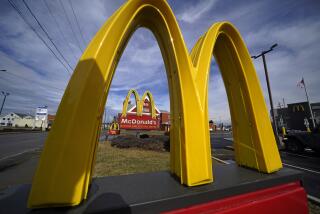Why environmentalists want Impossible Burger’s meatless patties to be pulled off menus
The plant-based Impossible Burger seemed like the kind of breakthrough in food technology that environmentalists could get behind.
The Silicon Valley makers of the fake meat that famously “bleeds” are championing a more sustainable food system by trying to reduce the dependence on intensive animal farming.
But environmental and consumer advocacy groups are calling on the company to pull its ersatz burger from the market until it can prove the genetically engineered ingredient that gives the patty its uncanny beef-like quality is safe to eat.
The activists are basing their opinion on documents obtained from the Food and Drug Administration through the Freedom of Information Act that show regulators have yet to deem the special ingredient fit for consumption (though they did not say it was unsafe).
“The current arguments at hand, individually and collectively, were not enough to establish the safety of SLH for consumption,” an FDA memo said, referring to soy leghemoglobin, a protein found in soy roots that’s the basis for the burger’s meaty texture and flavor.
“Impossible Foods should pull the burgers from the market unless and until safety can be established by the FDA and apologize to those whose safety it may have risked,” said Jim Thomas of ETC Group, an advocacy group focused on socioeconomic and ecological issues, which requested the FDA documents along with Friends of the Earth. Those documents were first shared with the New York Times.
Impossible Foods, the makers of the fake meat, say their burger has been lab-tested and is safe to eat.
The company does not need FDA approval to sell its burger, but it still sought the agency’s safety designation of “generally recognized as safe.”
When the agency requested more data to determine factors such as whether or not its soy leghemoglobin was an allergen, the company rescinded its request for review.
Impossible Foods says its own testing shows the ingredient is not an allergen. But regulations don’t require the company to disclose those tests or even share them with the FDA.
The disagreement between the company and activists underscore the complexity of the debate over genetically modified food and the role federal regulators should play in policing new products.
The controversy comes at a time when more start-ups backed by some of the world’s richest investors are pouring resources into substitutes for meat, eggs and milk as a way of tackling industrial farming.
But these companies aren’t necessarily finding support with environmentalists eager to wean the world off its meat habit.
“The concern is that these biotech start-ups and these new companies using genetically engineered applications are rushing products to market inspired by investment and not public safety,” said Dana Perls, a senior policy analyst at Friends of the Earth.
Impossible Foods produces soy leghemoglobin by genetically modifying yeast and using fermentation. The ingredient is key because it carries heme, an iron-rich molecule found in real meat.
“Humans have been eating heme everyday for hundreds of thousands of years,” Impossible Foods said in a statement. “The heme in the Impossible Burger is atom-for-atom identical to the heme found in meat, fish, plants and other foods.”
Impossible Foods says it has sold 50,000 pounds of its fake meat already. The product can be found at chains like Umami Burger and Bareburger as well as trendy restaurants such as David Chang’s Momofuku Nishi in New York and Jardinière in San Francisco.
The Redwood City, Calif.,-based Impossible Foods has raised $257 million in funding from investors including Bill Gates and Li Ka-shing, Hong Kong’s richest man.
Follow me @dhpierson on Twitter
More to Read
Inside the business of entertainment
The Wide Shot brings you news, analysis and insights on everything from streaming wars to production — and what it all means for the future.
You may occasionally receive promotional content from the Los Angeles Times.











